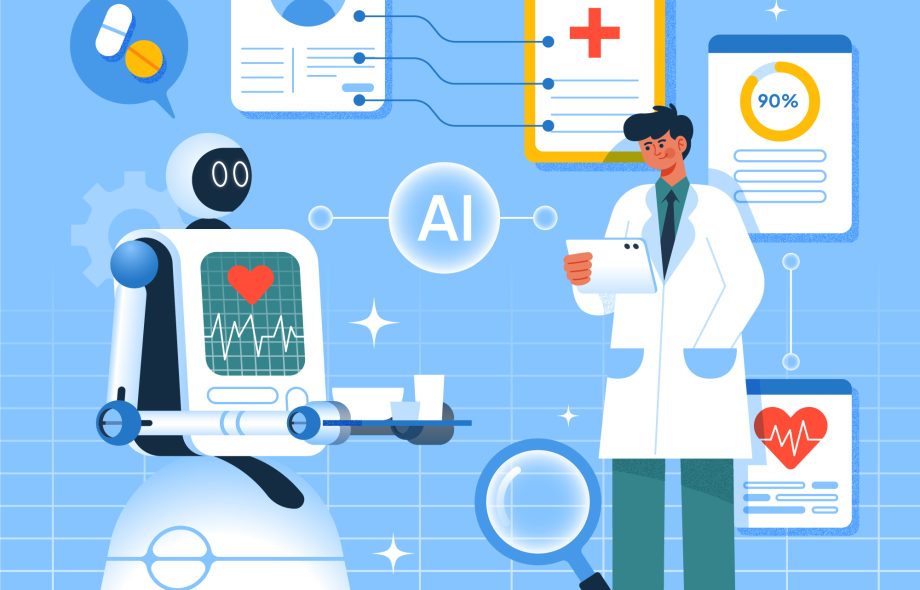Introduction
Healthcare is no longer reactive. Thanks to artificial intelligence (AI), it is becoming predictive, personalized, and increasingly autonomous. At the center of this transformation are intelligent systems known as AI agents in healthcare autonomous software capable of performing complex clinical functions like triage, diagnostics, care coordination, and patient support.
However, building and safely deploying these agents at scale requires deep domain knowledge, technical expertise, and regulatory awareness. This is where AI agent development services come in. These specialized teams enable healthcare organizations to transform raw AI potential into real-world solutions that streamline patient journeys from triage to treatment.
Understanding AI Agents in Healthcare
An AI agent is a self-directed digital system that uses input from its environment (e.g., patient symptoms, EHR data, diagnostic images) to make informed decisions or recommendations without continuous human supervision.
In healthcare, AI agents are trained to:
-
Triage patients based on urgency and symptoms
-
Support clinical diagnosis using structured and unstructured data
-
Manage patient communication post-treatment
-
Monitor real-time vitals and trigger interventions
-
Coordinate multi-disciplinary care workflows
These tasks, traditionally managed manually by physicians or nurses, can now be partially or fully delegated to intelligent agents, allowing medical professionals to focus on higher-order responsibilities.
Triage 2.0: AI Agents on the Frontline
In overcrowded emergency departments and telehealth platforms, triage is both critical and chaotic. AI agents bring structure, speed, and accuracy by:
-
Asking the right intake questions via chatbots or voice assistants
-
Analyzing symptoms using NLP and medical knowledge graphs
-
Prioritizing patient urgency using predictive risk scoring
For example, a virtual AI triage agent can assess a patient’s chest pain through a chatbot, correlate it with history and vital signs, and flag the case as urgent to a physician—within seconds.
AI agent development services play a key role here. They help:
-
Build symptom-intent models
-
Ensure data privacy in chat interactions (HIPAA compliance)
-
Optimize decision trees based on medical protocols
Diagnosis and Decision Support
After triage, AI agents assist clinicians in making faster, evidence-backed diagnostic decisions.
They integrate data from multiple sources:
-
Lab results
-
Imaging reports
-
EHR histories
-
Clinical guidelines
Agents can then suggest differential diagnoses or identify inconsistencies—reducing cognitive overload on physicians.
But accuracy in these decisions depends heavily on:
-
Model training quality
-
Bias mitigation
-
Clear explainability
Specialized AI agent development services offer:
-
Access to high-quality, de-identified datasets
-
Responsible AI pipelines
-
Visual reasoning tools to justify decisions
This builds the trust clinicians need to incorporate agents into diagnostic workflows.
Care Coordination and Workflow Automation
After diagnosis, healthcare becomes a coordination challenge. Referrals, test scheduling, insurance checks—all slow the process.
AI agents can now:
-
Auto-schedule appointments based on availability and urgency
-
Send smart reminders to patients for follow-ups or medication
-
Sync with EHRs to ensure continuity across departments
Agentic automation, when executed well, reduces friction in the patient journey and significantly improves throughput.
AI agent development services support this by:
-
Designing agents that integrate with hospital IT infrastructure (HL7/FHIR)
-
Setting up escalation protocols for complex cases
-
Ensuring data traceability and audit readiness
Post-Treatment: Recovery, Monitoring, and Re-engagement
The patient journey doesn’t end with treatment. AI agents can continue to:
-
Monitor recovery via remote patient monitoring (RPM) devices
-
Intervene early in case of symptom recurrence
-
Provide emotional support through empathetic conversational interfaces
AI in Emotion Recognition is also being embedded into these agents to sense tone, mood, and distress levels during interactions. This enables more compassionate, personalized care post-discharge.
Again, this requires well-trained, well-tested systems. Expert AI agent development services build these features using:
-
Multimodal data (voice, text, biometrics)
-
Sentiment-aware NLP frameworks
-
Human-in-the-loop retraining pipelines
Case Example: Triage to Treatment with AI Agents
Use Case: A Multispecialty Hospital
Problem: Long triage-to-treatment cycle for cardiac patients
Solution: The hospital worked with a specialized AI development company to create an end-to-end virtual care AI agent.
Functions included:
-
Triage via chatbot: symptom intake, red flag detection
-
Risk stratification using EHR + wearable data
-
Scheduling diagnostics and cardiology consultations
-
Post-visit follow-ups with medication reminders
Result:
-
36% reduction in time from symptom report to first consultation
-
27% increase in diagnostic adherence
-
91% patient satisfaction score
This was only possible through the strategic collaboration with a certified AI agent development service provider that understood both medical safety and enterprise-grade deployment.
Why Partnering with AI Agent Development Services Matters
Developing agents for casual use (like retail or gaming) is vastly different from healthcare. The stakes are higher, data more sensitive, and workflows more complex.
Key reasons to partner with AI development firms:
-
Healthcare-grade engineering
-
Certified regulatory documentation
-
Medical UX expertise
-
Scalable architecture for high-traffic platforms
-
Support for ongoing model tuning and monitoring
These firms act as innovation enablers, helping health systems transition from theory to working solutions—without compromising safety or speed.
What to Look for in an AI Agent Development Partner
-
Experience with agentic systems in clinical settings
-
Proven track record in HIPAA and GDPR-compliant AI builds
-
A diverse AI stack: NLP, predictive modeling, federated learning
-
Agile collaboration models for co-development with hospital teams
-
Strong after-deployment MLOps capabilities
Conclusion
The full potential of AI agents in healthcare will be realized only when they can guide patients from the first symptom to the final recovery step—safely, accurately, and empathetically.
By working with expert AI agent development services, healthcare organizations can deploy these intelligent systems responsibly and effectively. The result? Lower operational strain, improved patient experiences, and a smarter, more resilient care delivery system.
From triage to treatment—and everything in between—AI agents are becoming indispensable. Now is the time to invest in building them right.
 :
https://au.pinterest.com/elizasmiths870
:
https://au.pinterest.com/elizasmiths870

